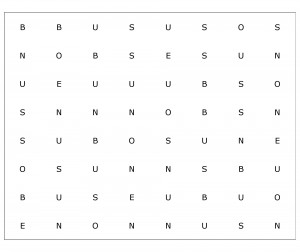Brain teaser to test your attentional focus and multi-tasking abilities

How often do you review and comment on a document while talking on the phone with a colleague about an unrelated matter? Or think about your problems at work while helping your child with his homework?
We are often exposed to information and task overload, and required to do multiple things at once. And we often don’t recognize how multi-tasking is enemy number one when it comes to accurate and speedy performance…if you try to read a document while talking on the phone with a colleague, you will probably sound distant and uninterested and may not get the buy-in you expected to get. If you think about your problems at work while helping your child with his homework, you will probably miss opportunities to teach him something valuable.
The fact is, human attention is a limited resource. Think about your attentional focus as the beam of a light. If the light is on an object it cannot be on other objects at the same time with the same intensity. Only dim light will be available to light up the objects in the periphery. The same happens in your attentional system. Dividing attention results in less attentional power devoted to all the different tasks that you are trying to do at the same time. The more tasks, the less attention can be devoted to each. The result is more errors and waste of time. Although we all have the feeling that multitasking saves us time, it is often not the case. It is important to prioritize, and to sequence, those tasks.
Try this exercise to test your attentional focus and multi-tasking abilities. Three words have been combined to make the grid of letters above. How many times does each of these words appear…? Can you compare your performance while searching for just one word vs. two of them at the same time? (or even the three of them, if you feel ambitious?)
How many times is the word SUN shown?
How many times is the word BUS shown?
How many times is the word NONE shown?
—
Solutions:
Sun is shown 12 times
Bus is shown 8 times
None is shown 4 times
 — Pascale Michelon, PhD is a scientist, educator, and contributing author to “The SharpBrains Guide to Brain Fitness: How to Optimize Brain Health and Performance at Any Age” (April 2013; 284 pages).
— Pascale Michelon, PhD is a scientist, educator, and contributing author to “The SharpBrains Guide to Brain Fitness: How to Optimize Brain Health and Performance at Any Age” (April 2013; 284 pages).
More brain teaser games:



The analogy with light beam with a flashlight is a very good one.